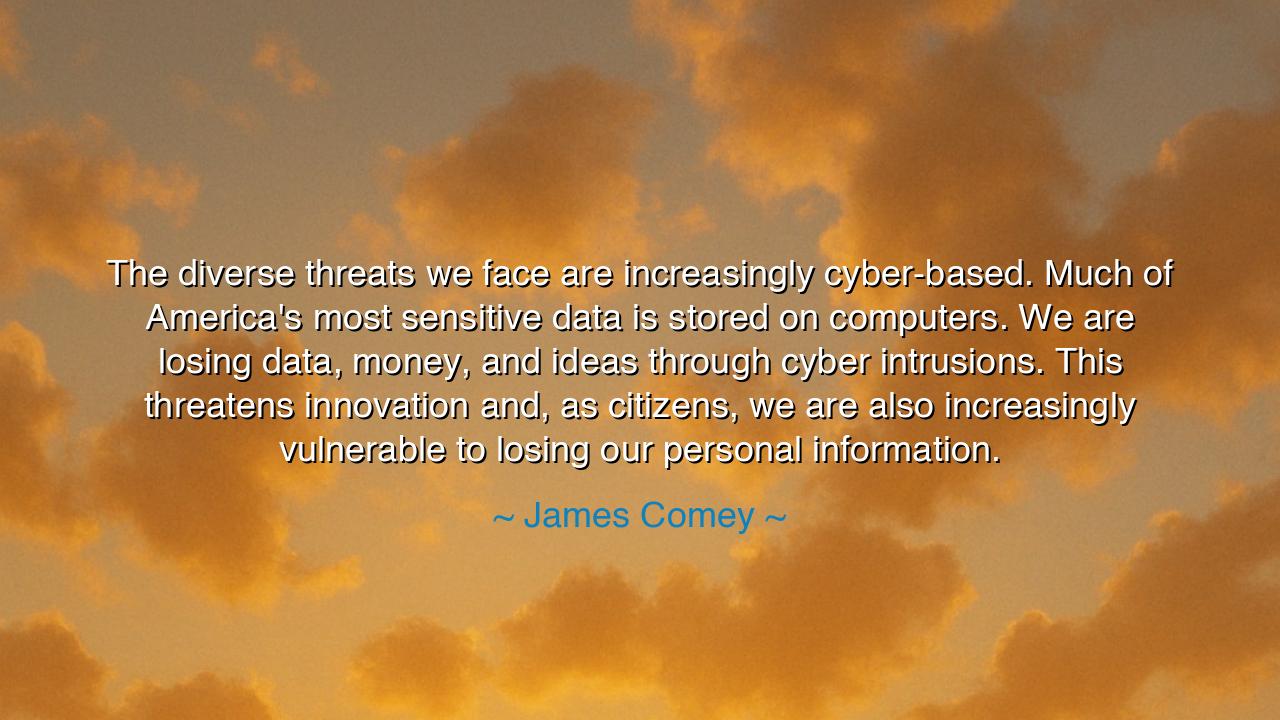
The diverse threats we face are increasingly cyber-based. Much of
The diverse threats we face are increasingly cyber-based. Much of America's most sensitive data is stored on computers. We are losing data, money, and ideas through cyber intrusions. This threatens innovation and, as citizens, we are also increasingly vulnerable to losing our personal information.






When James Comey spoke of the growing dangers in our modern world, stating, “The diverse threats we face are increasingly cyber-based. Much of America’s most sensitive data is stored on computers. We are losing data, money, and ideas through cyber intrusions. This threatens innovation and, as citizens, we are also increasingly vulnerable to losing our personal information,” he was offering a grave warning about the perils we now face in the digital age. Comey’s words are a call to recognize that cybersecurity is no longer just a matter for governments or corporations, but an issue that impacts every citizen. The vulnerability we face in the 21st century is not just physical, but digital, and it threatens to undermine the very foundation of our society, from innovation to personal safety.
In the ancient world, the fortress was the primary protection against invading forces. The walls of the city, fortified gates, and armed soldiers were designed to protect the people and preserve the wealth and wisdom of their civilization. Similarly, in the modern world, our digital infrastructure is the new fortress, but it is one that is increasingly susceptible to attack. Just as the ancient cities would fall when their walls were breached, today, our personal data, financial systems, and intellectual property are at risk when we fail to protect our digital boundaries. The cyber intrusions Comey refers to are like modern-day sieges, but instead of battering rams and catapults, the weapons are lines of code, viruses, and hacking techniques.
The meaning of Comey’s quote is rooted in the realization that cyber intrusions pose a threat that is both invisible and insidious. These attacks are not like traditional threats, which are often easily identifiable and require physical strength to combat. Instead, these intrusions are cloaked in anonymity and executed with such precision and speed that they can go unnoticed until the damage is already done. Much like the hidden dangers in the ancient world — poison, treachery, betrayal — cyber threats operate in the shadows, undermining trust and security without ever being physically witnessed. As Comey points out, the loss of data, ideas, and money isn’t just an inconvenience; it threatens the very core of innovation. Our creativity, our progress, and our future depend on the security of the information we create and store.
The historical example of the Pentagon Papers offers insight into the profound consequences of information breaches. In 1971, Daniel Ellsberg, a former military analyst, leaked classified documents that exposed the United States’ role in the Vietnam War. The revelation shook the foundation of the American government, revealing the vulnerability of even the most secure institutions to the threat of information theft. While the Pentagon Papers were a product of human courage and moral judgment, today’s cyber threats are a far more complex and elusive danger. These attacks come not from a whistleblower’s courage, but from hackers and foreign adversaries whose motives may be driven by political power, financial gain, or the desire to disrupt society itself. The Pentagon Papers were a wake-up call, but in the digital age, the stakes have risen — the threat to both national security and personal privacy has reached unprecedented levels.
Comey’s statement also underscores how vulnerability to cyber threats extends beyond governments and corporations. Individuals, too, are increasingly at risk. Our personal information — from bank accounts to health records to social identities — is often stored in digital form, making it an attractive target for those who seek to steal, exploit, or manipulate it. This personal threat is not just an abstract concept but a very real danger. Identity theft, financial fraud, and even the loss of personal privacy are becoming more prevalent as more of our lives move online. It is not just the data of governments that is at risk, but the security of our very identities as individuals in the world.
The lesson in Comey’s words is a call to recognize that digital security is no longer optional. It is essential for both personal and societal well-being. As individuals, we must take responsibility for safeguarding our own digital lives, just as we would protect our homes or our physical possessions. For society at large, the challenge is even greater: we must protect the institutions that serve as the backbone of our economy, our government, and our future. This protection requires not just awareness, but action: investment in cybersecurity, the development of stronger digital infrastructures, and a collective commitment to preserving the integrity of the digital world we have created.
Practical steps to safeguard against the growing threat of cyber intrusions are essential:
-
Educate yourself about cybersecurity: Understand the basics of digital security, from strong passwords to two-factor authentication.
-
Use secure platforms and services: Ensure that the systems you use are equipped with up-to-date security measures and encryption.
-
Stay vigilant: Monitor your accounts regularly for signs of fraud or unauthorized access, and take quick action when necessary.
-
Advocate for stronger cybersecurity: Support efforts, both personal and professional, to create and maintain robust defenses against cyber attacks.
For as James Comey so wisely warns, the digital age brings with it not just opportunity but also vulnerability. In this new world, our most valuable assets — our ideas, our money, and our identities — are stored in digital form, and they must be protected with the same care and vigilance as the treasures of ancient kingdoms. In embracing the potential of technology, we must also accept the responsibility of defending it — for in the protection of our digital lives lies the security of our future.






AAdministratorAdministrator
Welcome, honored guests. Please leave a comment, we will respond soon